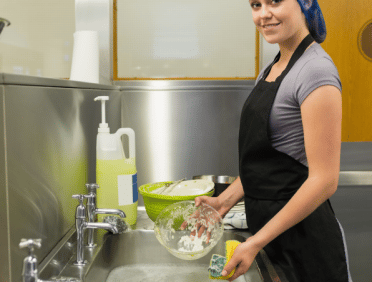Filter by
Hazard Analysis and Critical Control Points (HACCP) is a systematic approach to identifying and preventing hazards in food production and processing. HACCP is essential in food safety training as it helps to identify potential hazards and develop preventive measures that can reduce the risk of contamination and ensure the safety of food products.
HACCP training is particularly important in the food industry, where there is a high risk of contamination and foodborne illness. By implementing HACCP principles, food businesses can reduce the risk of food contamination, improve food safety, and protect the health of their customers. HACCP also helps businesses to comply with food safety regulations and to demonstrate to customers and regulators that they are taking food safety seriously.
The cost of getting a food hygiene rating can vary depending on the type of business and the location. In the UK, food businesses can receive a food hygiene rating from 0 to 5 based on the results of an inspection by the Environmental Health Officer (EHO). The cost of the inspection is usually borne by the local authority, but some businesses may be required to pay a fee for the inspection.
The cost of improving a food hygiene rating can also vary depending on the improvements needed. Improvements may include training staff in food safety, improving cleaning and sanitizing procedures, and upgrading equipment and facilities. The cost of these improvements can range from minimal to significant depending on the size and complexity of the business.
It is important to note that investing in food safety is essential for protecting the health of customers and the reputation of the business. Compliance with food safety regulations and achieving a high food hygiene rating can also help businesses to attract and retain customers, leading to financial success in the long term.
The Food Safety Act protects the consumer by setting out legal requirements for food businesses to ensure that the food they serve is safe to eat. The act covers all aspects of food safety, including the production, processing, distribution, and sale of food. It requires that businesses take all reasonable precautions to ensure that the food they serve is safe and that it meets legal requirements.
The Food Safety Act also gives the Food Standards Agency (FSA) powers to enforce food safety regulations and to take action against businesses that breach these regulations. The FSA can carry out inspections, take samples, and issue enforcement notices or prosecute businesses that do not comply with food safety regulations. This ensures that businesses take food safety seriously and that consumers can have confidence in the safety of the food they eat.
Food hygiene and safety legislation protect businesses by setting out legal requirements that businesses must follow to ensure that the food they serve is safe to eat. The legislation includes requirements such as ensuring that food handlers have appropriate training, that premises and equipment are clean and maintained, and that food is stored at the correct temperatures. By following these requirements, businesses can reduce the risk of foodborne illness and protect the health of their customers.
Compliance with food hygiene and safety legislation is not just important for protecting the health of customers; it also protects the business from legal action, financial losses, and damage to reputation. Non-compliance can result in legal action, which can be costly in terms of fines, legal fees, and compensation claims. Therefore, it is essential that businesses understand and comply with food hygiene and safety legislation.
Food safety is an essential aspect of any business that deals with food. There are several steps you can take to keep food safe in your business. Firstly, make sure that all the food is stored at the right temperature. Cold food should be stored below 5°C, and hot food should be kept above 63°C. Secondly, ensure that you keep raw and cooked foods separate. This can be done by using different chopping boards, utensils, and storage containers. Thirdly, practice good personal hygiene, such as washing hands before handling food and wearing clean clothing. Fourthly, regularly clean and sanitize all food preparation and storage areas. Lastly, ensure that you train your staff in food safety practices to ensure they understand the importance of food safety.
Keeping food safe in your business is not just important for the health of your customers, but it also protects your business reputation. Food safety incidents can lead to negative publicity, loss of customers, and legal action. Therefore, it is essential to implement good food safety practices and regularly review your procedures to ensure they are up-to-date.
Yes, “mandatory” and “compulsory” are often used interchangeably to mean that something is required or obligatory and cannot be omitted or disregarded. When something is described as mandatory or compulsory, it means that it must be done and failure to comply can result in consequences such as fines, penalties, or disciplinary action.
For example, a mandatory training program is one that must be completed by employees as a condition of their employment, and failure to complete the training can result in disciplinary action, such as termination of employment.











